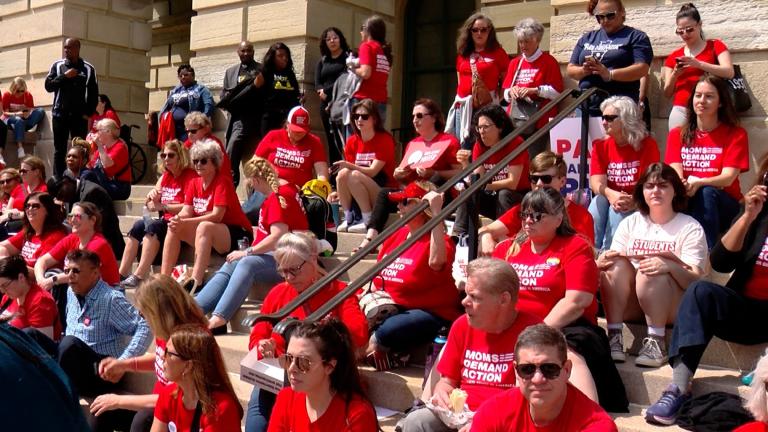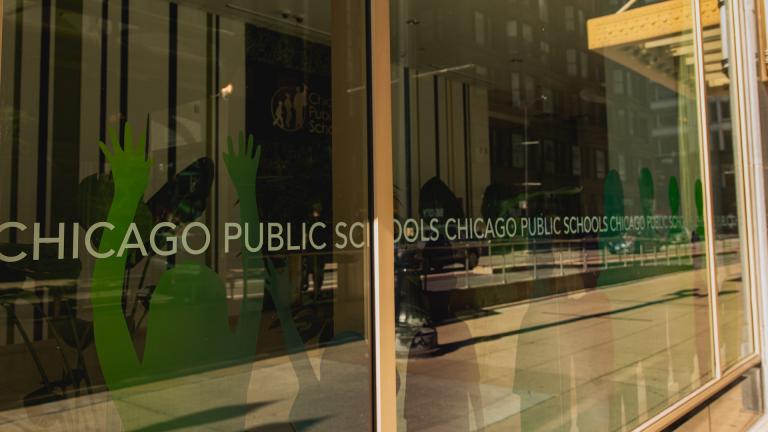It will be up to Gov. J.B. Pritzker to slice in half spending on health care for undocumented immigrants, and Illinois House Speaker Emanuel “Chris” Welch said he’s confident the governor can do it.
The Pritzker administration had estimated a Medicaid-style program in which the state provides health coverage to eligible undocumented residents would run Illinois about $1.1 billion — a cost that proved to be a sticking point in budget negotiations.
The state budget ultimately approved by the General Assembly over the weekend allocates half that and includes provisions that will allow Pritzker to make changes to the program, like instituting copays to keep down expenses.
Republican skeptics cast doubts on whether it’s practically or politically possible for Pritzker to keep the program to the budgeted $550 million in the next fiscal year, but during a “Chicago Tonight” appearance on Wednesday, Welch said he’s “confident” it can be done, and that Pritzker can contain growth of the program via the “tools” provided by the General Assembly and through the limited expenses eligible for matching federal funds.
“These are folks that are here, they’re working, they’re paying taxes,” Welch said. “If they were sick without this program, they will go get health care in emergency rooms. That would cost us all a lot more money. We’re very confident that we gave the governor the tools that he needs to manage the program.”
Separately, the state budget allocates about $42 million for Chicago and other communities to spend on supports for asylum-seekers. A flood of migrants, many sent to the city from Texas, lack housing and fundamental needs, putting a massive strain on Chicago’s budget. A dearth of shelter space means families are stuck sleeping on floors in the entryways of police stations.
Welch pointed out that before he was speaker, in 2017 he was a lead co-sponsor of the Trust Act, which “made Illinois the most welcoming state in the country” by limiting Illinois law enforcement agencies from cooperating with federal immigration agents if federal officials don’t have a warrant — a restriction intended to make undocumented immigrants feel comfortable cooperating with police without fear of deportation.
“We are a welcoming state, Chicago’s a welcoming city,” Welch said. “And you can’t just talk the talk, you have to walk the walk. And you know, we believe in helping people.”
But the state support for asylum seekers is a relative drop in the bucket compared with estimated costs.
Chicago Mayor Brandon Johnson had sought significantly more in state support, with an ask of up to $200 million.
Asked why the General Assembly didn’t allocate more money given his belief in “helping people,” Welch said, “We also have to do it in a in a fiscally responsible way. We do have a whole host of things that we have to balance, and I think this was the right way of going about it. We’re not ignoring the new arrivals. We’re actually being consistent with our values and welcoming them to this great state. Hopefully, they’ll stay and, you know, we’re looking forward to being a partner in this endeavor in the years to come.”
The state budget makes investments in education, universities and anti-violence programs; raises the wages of those who work directly with individuals with developmental disabilities; and more.
The budget also provides for 5.5% raises for elected officials, including members of the General Assembly, who will now be paid a base of nearly $90,000 with those in leadership making more.
There’s been some public pushback over the raises; one legislative staff member said some legislators have been on the receiving end of death threats. There’s also a question as to whether the pay increase goes above and beyond a state statute that limits salary bumps to 5%.
Welch said he hasn’t been on the receiving end of harmful threats. He also said that to have forgone the raises would be unconstitutional, based on rulings of previous lawsuits.
“I know that the Republicans are trying to make it out to more than what it is,” Welch said. “But our lawyers have advised that everything we’ve done is proper.”
Welch leads a historic majority of 78 Democrats, who he’s dubbed “The Great 78,” in contrast to the House’s 40 Republican members.
While the minority Republicans in the Senate complimented that chamber’s Democratic leadership for involving them in budget talks, members of the House GOP said they were excluded by Welch and his team.
“Regardless of our weekly meetings, Speaker Welch, you gave a false hope for a new day,” House Minority Leader Tony McCombie said during the budget debate in the wee hours of Saturday morning. “The House Republicans were denied participation in many things, but most importantly, this year’s budget process.”
At the time, Welch pushed back against the notion, saying that he accepted every meeting with McCombie and any other legislator who requested one.
“Work with us and put some votes on the board! Put it on the board! Put it on the board. Don’t just talk. Walk with us,” Welch said during debate.
Welch doubled down on that stance Wednesday. He said McCombie’s assertion that she was left out is “not a truthful statement. She was performing for her caucus” and for “folks back home in her district. The reality is, I met with her weekly since the beginning of session. And we also had Republicans as a part of our working process. The budget was being worked on in a very bipartisan way.”
Welch said the GOP’s communication with him stopped weeks ahead of the vote when he asked Republicans to commit to putting votes on an as-yet unfinished spending plan.
He said the budget the General Assembly passed solely with support of Democrats provides for Republicans, too, for example by increasing operations spending for public universities — all of which are in GOP districts — by 7%.
Already, candidates are beginning to declare their intentions to run in the 2024 election. That will be the next chance Illinois voters will have to amend the state’s constitution.
Welch has previously rejected the notion of a second attempt at a question that would allow for income to be taxed at a graduated rate.
Democrats are considering adding a provision to the constitution that would codify abortion rights.
“I certainly think it’s something we should look at,” Welch said.
Follow Amanda Vinicky on Twitter: @AmandaVinicky








